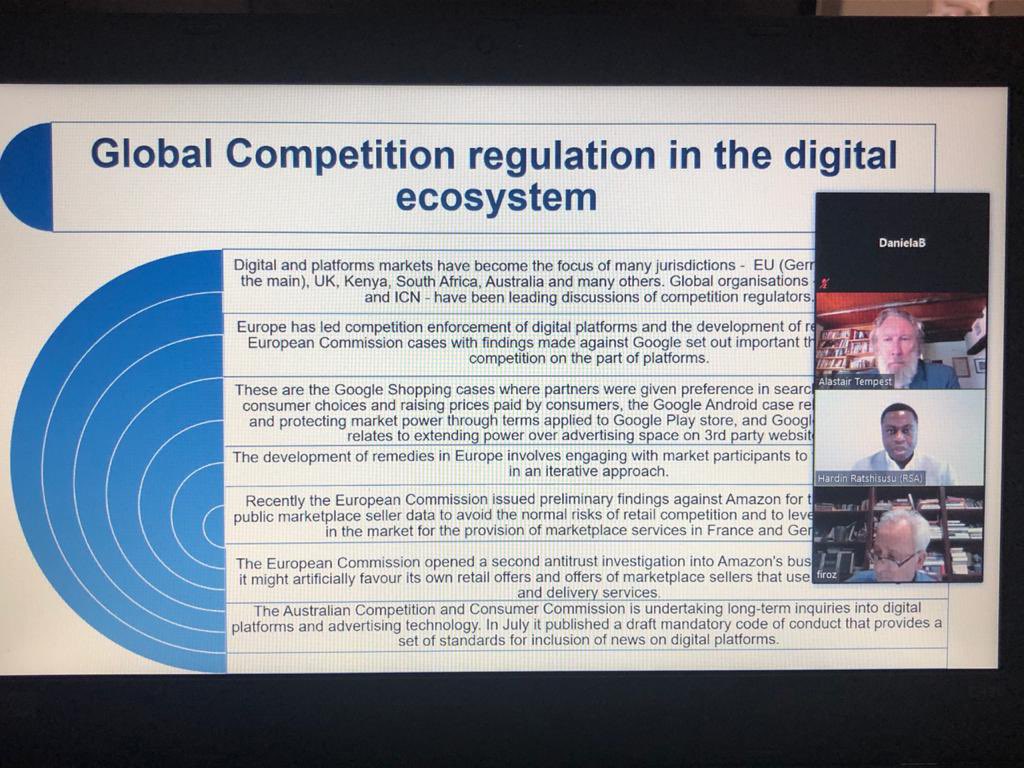Deputy Commissioner @hardinratshi is discussing @CompComSA’s recent paper on ‘ #Competition in the #Digital #Economy’ in a #webinar hosted in partnership with the Mandela Institute, a centre in the School of Law, of the University of the Witwatersrand.
@CompComSA is taking proactive steps to respond to #market conduct by dominant firms in the digital #economy. It is a #policy priority to ensure interventions promote innovation and the participation of small #businesses.
@CompComSA is investigating potential abuses of dominant positions in this space.
Develop practice note on the assessment of digital market mergers and mergers creep, updating the existing toolkits to account for specific features of digital markets.
Issue #guidelines, where appropriate in respect of conduct deemed likely to contravene the #CompetitionAct.
Institute a scoping study, impact study or market inquiry into #digital markets.
Mr Norman Manoim, Acting Judge of the South Gauteng High Court is talking about firms that are threatening not to do business in South Africa if there is over-regulation and is raising the question to the panelists what the approach should be.
Deputy Commissioner, @hardinratshi explains the paper is @CompComSA’s strategy and will be reviewed on an on-going basis.
Prof Liberty Mncube, Associate Professor, School of Economics and Finance, @WitsUniversity: “Has there been under enforcement? I don’t think so. The suggestion of changing merger thresholds for merger notifications comes from jurisdictions that have different considerations.
There is no significant need to change them in South Africa.”
On the issue of #merger creep, it’s important not to look of the individual trees but to have a view of the forest. I understand where @CompComSA is coming from. There is an open question on the #enforcement vehicle that @CompComSA will take.
Alastair Tempest, CEO of E-commerce Forum of South Africa commends @CompComSA on a well researched and throughout paper.
We feel it’s important to have a careful look at what is going on in the rest of the world. We live in a global #tech world. It’s far too soon to start identifying #firms that are dominant because the #markets are changing. We have to do mapping and #data analysis.
Mr Xolani Nyali, Partner at Bowmans: “the digital economy exists along a continuum. The #industrial #economy exists within some aspects that have been digitised. To take a perse rule approach would be a too blunt instrument.”
We should be looking into the digital economy rather than the old industrial economy. @CompComSA could introduce presumptions if there is evidence of a contravention. This can balance innovation and legitimate competition concerns of @CompComSA.
We want to alow authorities to step in.
Norman Manoim comments the idea of presumptions is an interesting one and could be considered by @CompComSA.
Alastair Tempest: firms may have the same algorithms but they may deliver different results.
We do need national championing of the #digital #economy through investment. National champions of what?
Prof Liberty Mncube: there is no limit of the ways we can formulate theories of harm in the #digital #economy. Mechanisms of exclusion such as predation, tying are sometimes blended theories of harm.
The #law focuses on the right questions which is the outcome of the exclusionary conduct.
I see this report as an advocacy approach of @CompComSA. I do not see a need to update the #enforcement mechanism on exclusion.

 Read on Twitter
Read on Twitter




